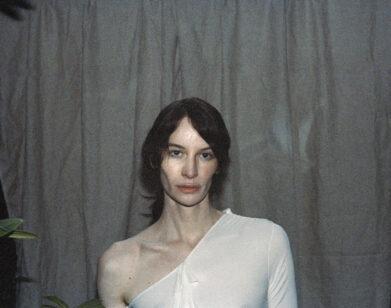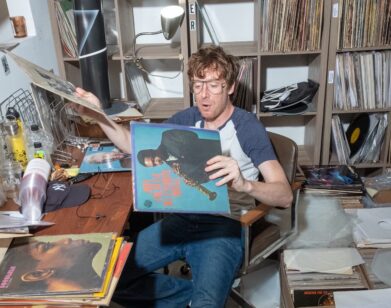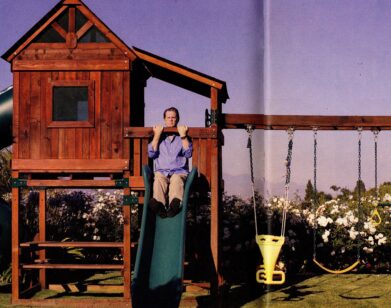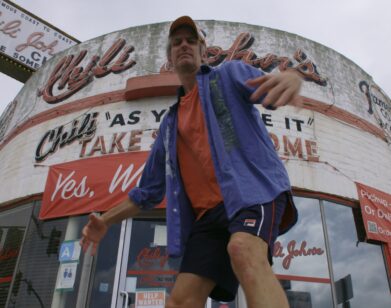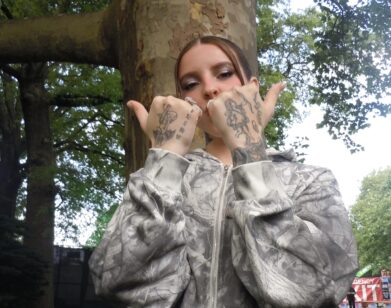Until the Ribbon Breaks, On Tape
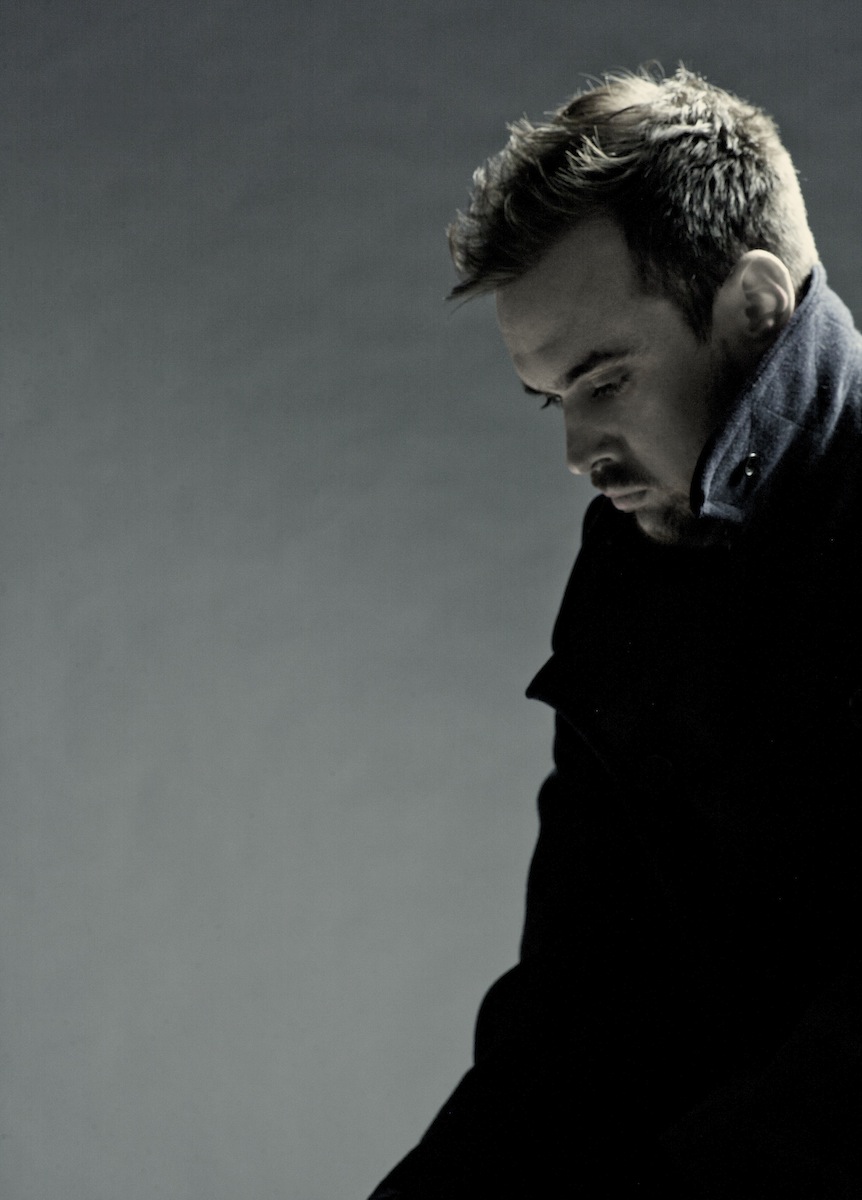
ABOVE: PETE LAWRIE WINFIELD, AKA UNTIL THE RIBBON BREAKS
There’s a unique power to the pairing of music and film; energy harnessed in droves by Pete Lawrie Winfield. The British DJ, producer, and singer elicits an ominous shade of pop under the moniker Until The Ribbon Breaks, fusing R&B beats with prophetic vocals that speak of isolation, social decay, and the crumbling world around us. Winfield’s observations are dark, but it’s the way they are communicated—with agitated, breathy vocals and lurching synths and drum machines—that demands repeat plays. Considering Until The Ribbon Breaks is a reference to cassettes and films played until they’re worn to shreds, the addictive nature of his songs is perhaps not that surprising.
Winfield’s debut EP, A Taste of Silver, is the fruit of an organic progression from film studies to a career in music. It has left him a creative hybrid, treading the line between music and film as he meshes patchworked visuals with his own deeply provocative tracks. After a busy year studded with two hyped single releases and support slots with New Zealand maven Lorde, Winfield is ready for the next step as the response to his EP chimes around him.
TEMPE NAKISKA: Were you exposed to a lot of music as a child?
PETE LAWRIE WINFIELD: Definitely. My parents are both musicians; my mum plays for the ballet, and my dad was a freelance musician, he played and toured all over the place. There was always music. I guess their escape from listening to and playing classical music was to listen to pop music. It was always Marvin Gaye, Stevie Wonder, and Elton John. Because they were musicians, there was always a piano in the house, and instead of a babysitter, they used to bring my sister and I to their rehearsals.
NAKISKA: When did you know you wanted to work in the music industry?
LAWRIE WINFIELD: I originally wanted to make films, and that’s what I went to university to study. But my films weren’t any good. [laughs] Then I started making music for my films, and I preferred that. I was about 18 then, and I veered then into doing more sound stuff, it grew from there.
NAKISKA: That’s something that’s quite different about Until The Ribbon Breaks; your way of expressing music visually, through your clips.
LAWRIE WINFIELD: The entire record was written with a film projector in the room. I projected silent film—not silent film as in Charlie Chaplin, but films with the sound off—and then wrote to that. So it’s written as if it were a soundtrack. To me, the marriage of visuals and music is much more powerful than either of those things on their own.
NAKISKA: Is that the way that you always work?
LAWRIE WINFIELD: Until The Ribbon Breaks started as a concept I had for one record. Ribbon being film or a cassette tape as the whole thing was based around this idea of the combination of music and film. At the time I made it I didn’t know how far I was going to go with it; whether I was going to do it live. But the time has gone by, and it’s now something that I really want to do.
NAKISKA: Musically, where do you draw your inspiration from?
LAWRIE WINFIELD: I skateboarded from the age of 12 to 20, and a lot of that whole scene is based on what music you listened to. Around that time, it really defines who you are. For me it was a lot of hip-hop, then some punk and things like that. I guess I revisited all of that while making the record; I wanted to be influenced by everything. I wanted people not to be able to define it by genre. So I purposefully didn’t listen to music so much while I was making it. The films I was watching inspired the music more than music inspired the music.
NAKISKA: What kind of films are we talking? You used a lot of David Lynch visuals, what intrigues you about his work?
LAWRIE WINFIELD: You can turn the sound off and its still captivating. I also used a lot of Terrence Malick films; same thing, you can turn the sound off and it’s still beautiful. You can then remake the soundtrack to it. Both of those directors use a lot of montage and their moods are often mysterious, dark and gloomy. I love all of that.
NAKISKA: You’ve tagged those kinds of reinterpretations as “reimaginations,” right?
LAWRIE WINFIELD: Exactly, exactly.
NAKISKA: So what is it about applying your skills to somebody else’s work you enjoy?
LAWRIE WINFIELD: That I don’t have to worry about singing. [laughs] It’s a good question. I will only remix or reimagine something where I love the original. It’s not a diss to The Weeknd, but some things I love so much that I wouldn’t be able to do that. With their track I just really wanted to reimagine that, there were lines I could imagine over a different setting.
NAKISKA: Lyrics are the other big thing I wanted to talk about. Do you see lyrics as a true platform for personal expression?
LAWRIE WINFIELD: One hundred percent. Lyrics, to me, are the most essential part of writing music. I always start with the music, and depending on how I feel and what mood the music is conveying, that gives me an idea of what kind of thing I should be saying over it. It’s not like I go and sit somewhere with a notepad; I don’t write like that. For instance, there are 12 songs on the album, and they’re the only 12 songs I wrote. I don’t write songs all the time, I write to write. But yes, the words really matter to me. The most important thing for me is thinking that the words should have meaning separate to the music. I never want them just to facilitate a song.
NAKISKA: And at the same time, your lyrics are quite relatable; there are metaphors, but they are never complex. Is that one of your aims as well?
LAWRIE WINFIELD: It’s funny you should say that. I went back home to Wales and set up a studio there and just isolated myself for a long time to make that record. It’s nice to hear that it feels relatable because I definitely was open, being on my own.
NAKISKA: Are all the experiences your own, or do you draw from other people’s experiences too?
LAWRIE WINFIELD: No, I can’t character write. I can’t put myself in different shoes. It’s always about something I’ve experienced or something very close to me.
NAKISKA: Looking at a track like “2025,” it’s quite dark in a sense, being about the negative mechanisms of our society. I get the feeling that there’s a lot of sadness in that song.
LAWRIE WINFIELD: Definitely. It’s really about me noticing that people are becoming more closed off to one another. You sit in a train and everybody is just plugged into their phone or laptop. It’s about us getting more and more detached from each other. The world’s getting smaller with the Internet, but at the same time, we’re growing apart. If that’s what we’re like now, then imagine what it will be like by the time we reach 2025.
NAKISKA: It’s scary. Social media and the Internet are making us so much more self-aware, but also much more isolated.
LAWRIE WINFIELD: Exactly. You wonder where it will stop. My sister’s a schoolteacher and she was saying they’re replacing paper and books with computers. It’s like a train you can’t get off, because no matter what you do the world will just keep going. You’ll get left behind. I was in the recording studio the other and asked the assistant if they had a pen I could use, and he looked at me like I was an alien! We tracked down a pen, but it was difficult.
NAKISKA: It’s something that happens very gradually. Do you think music is one form of expression that will stay as important as it has been throughout history?
LAWRIE WINFIELD: That’s a good question. What I hope is that 16-year-olds care as much about an mp3 as I did about music to save up all my pocket money for CDs I would then carry around with me. Everyone knew that’s what I was listening to, and that was so important. When I was supporting Lorde as a DJ, there were kids round the block desperate to get into the show and to meet her. It was encouraging. I think it always will be important because it’s how you say, “This is who I am.”
NAKISKA: I think that’s where the live experience is becoming so much more important as well.
LAWRIE WINFIELD: Definitely.
NAKISKA: How do you approach playing live?
LAWRIE WINFIELD: With baby steps, because I’ve never done it! My first actual live show, not as a DJ, will be on Tuesday.
NAKISKA: Are you nervous?
LAWRIE WINFIELD: Yeah, a bit. But we’ve been practicing all day, every day. We had to do that because it was a difficult record to work out how to do live. It’s definitely the most exciting aspect of the whole project though. Playing live is now the thing I want to do most.
A TASTE OF SILVER IS OUT NOW. UNTIL THE RIBBON BREAKS WITH LORDE ON SEPTEMBER 30 AND OCTOBER 1 AT WEBSTER HALL, NEW YORK CITY. FOR MORE INFORMATION, VISIT HIS WEBSITE.

